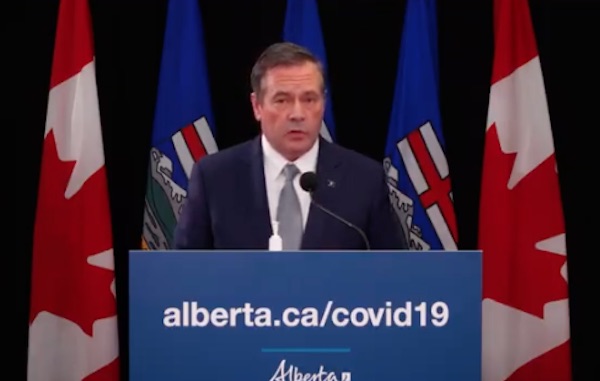Alberta
Alberta backtracks to bring unimmunized staff back to work

Temporary testing options given to health-care workers
At the direction of Alberta’s government, Alberta Health Services will provide all unimmunized physicians and staff the option of temporary frequent COVID-19 testing to ensure the anticipated demand on the health-care system caused by the Omicron variant can be met.
The testing option, which was previously available to a small number of unimmunized Alberta Health Services workers at specific work locations, will now be available to any unimmunized staff member who wants to return to work, as part of the Immunization or Testing of Workers for COVID-19 Policy, which will be reviewed by the end of March 2022.
As of Dec. 23, approximately 1,400 full- and part-time staff who are not fully immunized have been placed on unpaid leave. The testing option allows those staff to return to work if they accept the testing option.
Testing will be available at their expense, and unimmunized staff will be required to provide proof of a negative Health Canada-approved COVID-19 test that was completed no more than 48 hours before each of their working shifts. A positive rapid antigen test would require a PCR test.
“We stand by the Alberta Health Services workers immunization policy as we have from the start, and staff and physicians deserve credit for the high immunization coverage they’ve achieved. In light of the risk posed by the Omicron variant, we need to adjust the policy to maximize capacity and avoid losing any staff if we can while still keeping patients safe. The immunization policy is about putting patients first, and this adjustment continues to put patients first by supporting Alberta Health Services in planning to add capacity as needed.”
“We are concerned about the rapid rise in Omicron cases across the province in recent days, and anticipate that it could further impact our health-care system quickly. We must ensure we have the staff and resources required to care for our patients.”
Alberta’s government and Alberta Health Services strongly encourage all health-care workers – and all Albertans – to get immunized, including a third booster dose if they are eligible.
As has been the case for all four previous waves, the best way to protect our hospitals is for people to follow public health guidelines and restrictions, stay home when sick, wear a mask, and most importantly, get fully immunized, including a booster.
Quick facts
- More than 97 per cent of full-time and part-time staff have had at least two doses of COVID-19 vaccine.
- More than 99.8 per cent of physicians have had at least two doses of COVID-19 vaccine.
- More than 99 per cent of ICU staff have submitted proof of being fully immunized.
Alberta
Tell the Province what you think about 120 km/h speed limit on divided highways

Alberta’s government is engaging with Albertans on increasing speed limits on rural highways.
Starting Nov. 7, Albertans can share their views on modernizing speed limits on divided highways through an online survey running until Dec. 12. The survey will ask how Albertans view raising the speed limit by 10 km/h on various highways from 110 km/h to 120 km/h.
“Alberta’s government is investigating how to safely increase speed limits on divided highways, and if Albertans support increasing speed limits. We are investing more than $1.5 billion this year alone to improve highway safety and upgrade infrastructure across the province. We want Albertans to be able to drive the speed limit that the highways are designed for. Modern vehicles combined with public awareness mean we can explore higher speed limits.”
The survey will provide Albertans with the opportunity to provide input on which highways they would prioritize having a speed limit increase, their views on restricting commercial trucks from using the far-left lane on highways with three or more lanes and any other feedback that would improve driving experiences on provincial highways.
Following a review of the survey results, Alberta’s government plans to conduct a mini-trial of a 120 km/h speed limit to assess the impacts of higher speed limits on divided highways. The trial will include strong monitoring to assess driving behaviour.
Alberta’s government reminds motorists to slow down and drive to the conditions. Speed limits are set for ideal conditions. When roads are wet, icy or when there is reduced visibility, motorists should slow down.
Quick facts
- Alberta’s provincial highway network includes more than 64,000 lane kilometres of highways, about 11,700 lane kilometres of which are divided.
- The posted speed limits of Alberta’s divided highways range from 100 to 110 km/h, although the posted speed limits on segments passing through cities, towns and First Nation lands can be as low as 50 km/h due to factors such as signalized intersections, pedestrians and local access.
Related information
- The survey is available online.
Alberta
Alberta Announces Members of Class Size and Complexity Committee

A new Class Size and Complexity Cabinet Committee has been struck to address classroom challenges.
Taking action on class size and complexity
Classrooms in Alberta continue to grow and are becoming increasingly complex, and immediate action is needed to address these issues in the public education system. To meet these issues head on, the Class Size and Complexity Cabinet Committee has been created. The cabinet committee will help guide government policy and deploy resources to deal with class sizes and classroom complexity.
“We are committed to providing world-class education, and we’re building schools and funding education at a rate unprecedented in this province. This committee will help us address the concerns of teachers, parents and students around class sizes and complexity.”
Throughout November, Alberta’s government will continue work with school boards to collect data on class sizes and classroom composition. The cabinet committee will use this data to direct resources to the classrooms that need it the most. Starting in January, this data will be made available and released annually.
The Class Size and Complexity Cabinet Committee will be co-chaired by the Premier of Alberta and the Minister of Education and Childcare. It will also include non-voting members representing school boards, administrators and a teacher representative of the ATA. The committee will also hear from school boards, academic experts, teachers, educational assistants, complex needs specialists and parents to inform its decisions and guide this vital work.
“We heard teacher concerns, and we are providing solutions. The Class Size and Complexity Cabinet Committee will help us take immediate action and ensure teachers and students are given the support they need to succeed.”
In June 2025, Alberta’s government established the Aggression and Complexity in Schools Action Team to provide advice on addressing classroom complexity. The report has been received and will be released soon. Over the coming months, the cabinet committee will start rolling out solutions informed by the action team’s recommendations. In addition, the committee will guide the creation of a new inclusive education policy framework.
“The work of this committee will support teachers in responding to the growing complexity in our classrooms. We will ensure that the voices of the contributors to the initial work guide
solutions that truly improve the educational experience for students and the educators who serve them.”
“I appreciate the government’s recognition of the impact of classroom complexity and their commitment to working collaboratively for improvement. Supporting teachers ultimately improves classroom conditions and student outcomes.”
Using data collected, this cabinet committee will also guide Alberta’s government in executing its commitment to hire 3,000 new teachers and 1,500 new educational assistants over the next three years. They will also assist in identifying and prioritizing where new schools and modulars should be built, advancing the government’s commitment to invest $8.6 billion to build 130 new schools, and provide 109 modular classrooms in the growing communities that need them urgently.
Quick facts
- Members of the Class Size and Complexity Cabinet Committee include:
- Danielle Smith, Premier of Alberta
- Demetrios Nicolaides, Minister of Education and Childcare
- Jason Nixon, Minister of Assisted Living and Social Services
- Rick Wilson, Minister of Mental Health and Addiction
- Searle Turton, Minister of Child and Family Services
- Lynnette Anderson, chief superintendent, Edmonton Catholic Schools
- Nicole Buchanan, chair, Red Deer Public Schools
- Marilyn Dennis, former president of Alberta School Boards Association
- Mike McMann, superintendent, Fort Vermilion Schools and President, College of Alberta School Superintendents
- Joanne Pitman, chief superintendent, Calgary Board of Education
- Dr. Elissa Corsi, Alberta Teachers’ Association
- Only Cabinet members are voting members. Additional guests will be invited to attend and share their expertise at the discretion of the chairs.
- School boards will be required to submit data on Alberta classrooms by Nov. 24.
-

 COVID-192 days ago
COVID-192 days agoFreedom Convoy leader Tamara Lich to appeal her recent conviction
-

 espionage1 day ago
espionage1 day agoU.S. Charges Three More Chinese Scholars in Wuhan Bio-Smuggling Case, Citing Pattern of Foreign Exploitation in American Research Labs
-

 Business2 days ago
Business2 days agoCarney’s budget spares tax status of Canadian churches, pro-life groups after backlash
-

 Justice2 days ago
Justice2 days agoCarney government lets Supreme Court decision stand despite outrage over child porn ruling
-

 Daily Caller2 days ago
Daily Caller2 days agoUN Chief Rages Against Dying Of Climate Alarm Light
-

 Business23 hours ago
Business23 hours agoCarney budget doubles down on Trudeau-era policies
-

 COVID-1923 hours ago
COVID-1923 hours agoCrown still working to put Lich and Barber in jail
-

 Business23 hours ago
Business23 hours agoCarney budget continues misguided ‘Build Canada Homes’ approach






